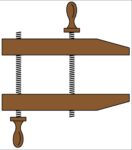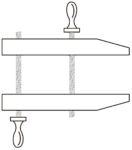Families often need help to dispose of unused woodworking equipment from a woodworker's estate. Woodworking shops typically contain power tools, hand tools, lumber and various other items unfamiliar to non-woodworkers. Determining the value and saleability of a shop's contents can be a challenging task. It can be difficult to decide whether to try to sell these items yourself, hire a professional estate seller or find an organization to receive a donation and receive a tax benefit. The San Diego Fine Woodworkers Association (SDFWA) may be able to assist you in making the right choice.
Overview
This section outlines what SDFWA can do to assist you. We have put together an experienced team of woodworkers to help families deal with the disposition of an unused woodworking shop during stressful times. If the shop is located in the immediate San Diego area we can visit the shop, conduct a brief survey of the contents, advise you as to the value and saleability of the equipment, tools and materials and explain various options for disposing of the shop. SDFWA is a 501(c)(3) non-profit organization and, if the contents are suitable, we can sometimes accept donations. For additional information send an email to us at: EstatePlanning@sdfwa.org
Estate Disposition Options
- Suggest alternatives for selling or donating tools and materials.
- With your approval we can post an inventory of the items you wish to sell and your contact information in our newsletter and on the Wants and Disposals page of the SDFWA website.
- Donations to our Association of woodworking tools in working condition can be accepted if the shop is located in the immediate San Diego area. SDFWA will remove all the donated items from the shop and leave it in clean, orderly condition. We will not be able to assist with disposition of items unrelated to woodworking. Donated tools may be used in our member shop, or sold to SDFWA members as appropriate.
- If you prefer to sell the contents of the shop, and the contents are suitable for SDFWA to sell on your behalf, we will prepare the shop for a sale in place, schedule and advertise the sale with your approval, conduct the sale, provide security, collect and account for payments received and clean up afterwards. Disposal of unsold items will be the responsibility of the estate. To compensate SDFWA for the time and effort involved in preparing for and conducting the sale we will retain 25% of the sale proceeds.
How SDFWA Can Help You
- Suggest alternatives for selling or donating tools and materials.
- With your approval we can post an inventory of the items you wish to sell and your contact information in our newsletter and on the Wants and Disposals page of the SDFWA website.
- Donations to our Association of woodworking tools in working condition can be accepted if the shop is located in the immediate San Diego area. SDFWA will remove all the donated items from the shop and leave it in clean, orderly condition. We will not be able to assist with disposition of items unrelated to woodworking. Donated tools may be used in our member shop, or sold to SDFWA members as appropriate.
- If you prefer to sell the contents of the shop, and the contents are suitable for SDFWA to sell on your behalf, we will prepare the shop for a sale in place, schedule and advertise the sale with your approval, conduct the sale, provide security, collect and account for payments received and clean up afterwards. Disposal of unsold items will be the responsibility of the estate. To compensate SDFWA for the time and effort involved in preparing for and conducting the sale we will retain 25% of the sale proceeds.
Checklist Steps if you Decide to Conduct a Sale Yourself
- Take stock by making an inventory of the contents of the shop and organizing items into categories; for instance, large power tools standing on the floor, bench mounted and portable power tools, hand tools, fasteners and finishing supplies, clamps, fixtures, accessories and jigs
- Arrange items of similar nature together, with small items on tables for display and large items placed for easy inspection. If available, place instruction manuals with all power tools.
- Price all items in advance and label with secure price tags.
- Discard clutter. It is best for someone not emotionally attached to the material to get rid of unsaleable items such as scraps of wood, loose fasteners and damaged tools.
- Evaluate lumber which falls into one of several categories: Furniture grade – hardwood lumber (e.g. maple, oak, walnut, cherry, mahogany), veneer plywood and larger pieces of furniture grade hardwood are usually saleable. Construction grade -decking material, plywood, MDF, molding, 2x4s, 2x6s, and other soft wood material may be saleable, but is not preferred by most woodworkers. It might be welcome at Habitat For Humanity ReStore locations or other community organizations. Shorts & Cut-Offs – Hardwood pieces less than 3 feet long. Small hardwood pieces are usable by wood turners for pens and other small items (check with San Diego Wood Turners – sdwt.org). Woodworkers can make use of shorter boards for building small projects such as boxes. High school wood shop programs can sometimes accept larger boards. Milled hardwoods – ¼” – 1” thick, widths from 3” – 12”, and lengths from 2’ to 8’ are of value to woodworkers if it is free of bug damage, nails and deep cracks. Small pieces of exotic species and figured hardwood are desirable for wood turners. Veneers are desirable if in good condition and stored properly. Blocks of wood for turning and carving – may be green or dry, large blocks, half or full logs, burls, squares, rounds, etc. It should be sealed with wax on the end grain and free of deep cracks. Spalted wood (caused by fungus) is valued as long as the wood is not too soft.
- Advertise the sale on Craigslist with a brief description each item for sale (model numbers are helpful), starting and closing times, location and a clearly defined cash and carry policy. High value tools can be advertised on eBay. Place posters announcing the sale in your neighborhood a few days before the sale.
- Decide in advance what your policy for bargaining will be.
- If possible, setup the location so that physical access is limited to a single entrance.
- Do not permit entry before the starting time. If possible, keep the door closed until starting time.
- Set up a table in a secure spot for checking out purchases and taking payments.
- Have a supply of small bills for making change.
- Make it clear that buyers are responsible for removing purchases at the time of sale except by special arrangement with the seller.
- Be sure that all items are marked with secure price tags.
- Arrange to have sufficient personnel to collect payment, assist buyers, provide security and help with heavy items.
Advice for our Members
We will all eventually reach a point when we are no longer able to do woodworking. If you are not present to direct the disposition of your tools and supplies, your family may be left to complete this task at a stressful time. You can make things far easier for your family by providing some guidance now. Any advice you give them in advance about your preferences for the disposition of the contents of your shop, an accurate inventory of the contents and estimates of the value of your tools will be helpful. This can be done informally or, preferably, in writing. You might also consider including directions about the disposition of your shop in your will. Directions could designate specific items to be given to special individuals or specify organizations to receive a donation. Of course you should consult an attorney to be sure your instructions meet the legal requirements for a will. In the past SDFWA members have named our Association to receive a bequest of their shop's contents. SDFWA would be grateful for such bequests in the future.





